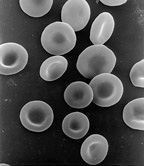
Photo from wikipedia
Acquired pure red cell aplasia (PRCA) is a syndrome characterized by anemia and a marked reduction of erythroid progenitor cells with various etiologies. The 3 major subtypes of PRCA are… Click to show full abstract
Acquired pure red cell aplasia (PRCA) is a syndrome characterized by anemia and a marked reduction of erythroid progenitor cells with various etiologies. The 3 major subtypes of PRCA are idiopathic PRCA, large granular lymphocytic leukemia-associated PRCA and thymoma-associated PRCA, which are thought to be caused by a T-cell-mediated mechanism. In these 3 subtypes, an expansion of clonal cytotoxic T cells is often detected. In addition, those T cells recurrently harbor somatic mutations of STAT3, a gene coding one of the important signal transducers in the JAK/STAT system. Somatic mutations of clonal hematopoiesis (CH)-related genes, including epigenetic modifying genes, have also been reported, however, the data are still not mature enough upon which to draw conclusion, Somatic mutations of STAT3 and CH-related genes may be unique characteristics of acquired PRCA. However, their involvement in dyserythropoiesis or clinical relevance to the clinical course of those somatic mutations. Mutational landscapes, their involvements in dyserythropoiesis and clinical relevance in acquired PRCA remains unclear, and further investigation is needed.
Journal Title: Seminars in hematology
Year Published: 2022
Link to full text (if available)
Share on Social Media: Sign Up to like & get
recommendations!